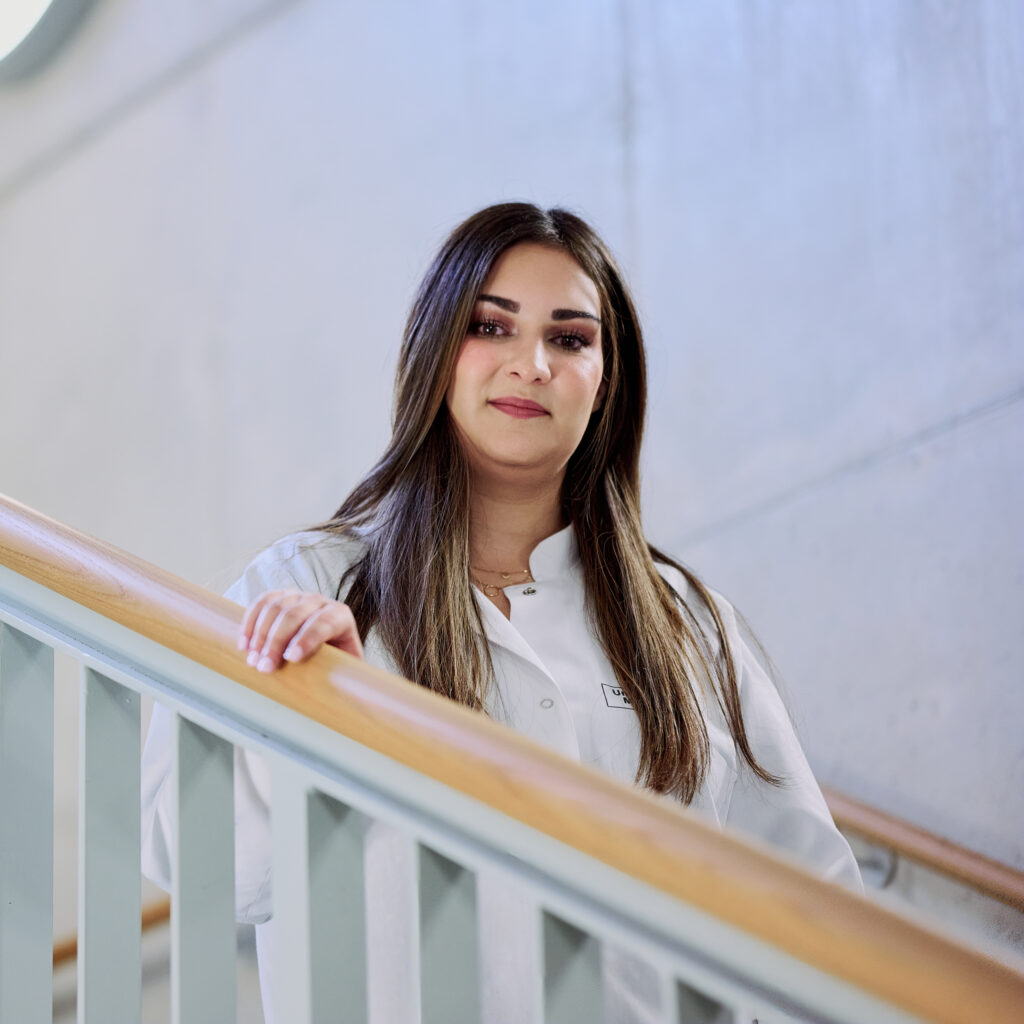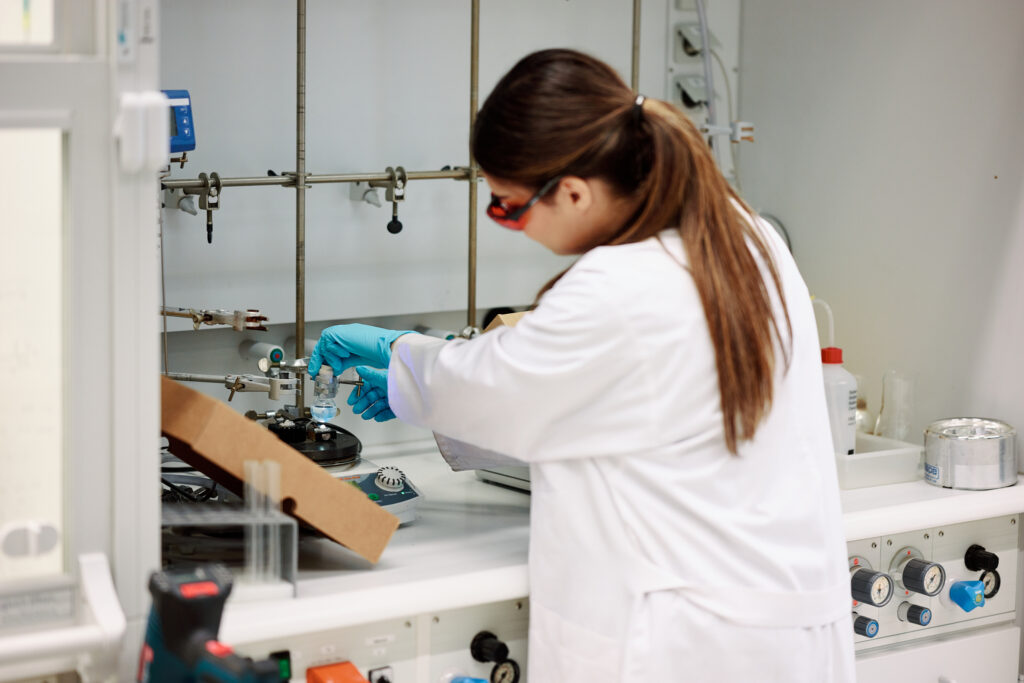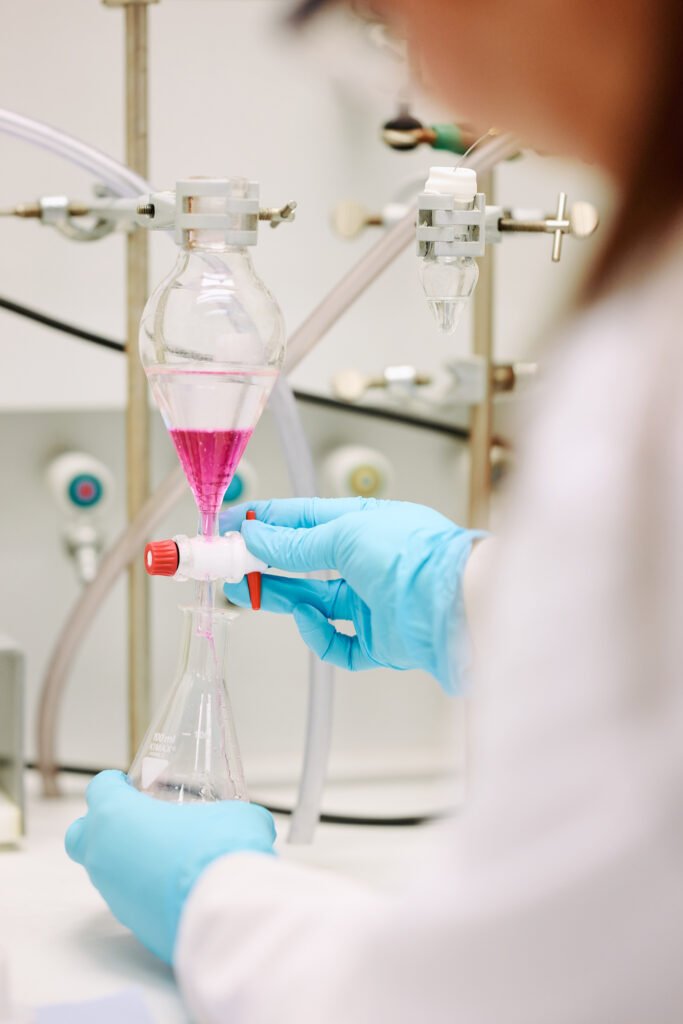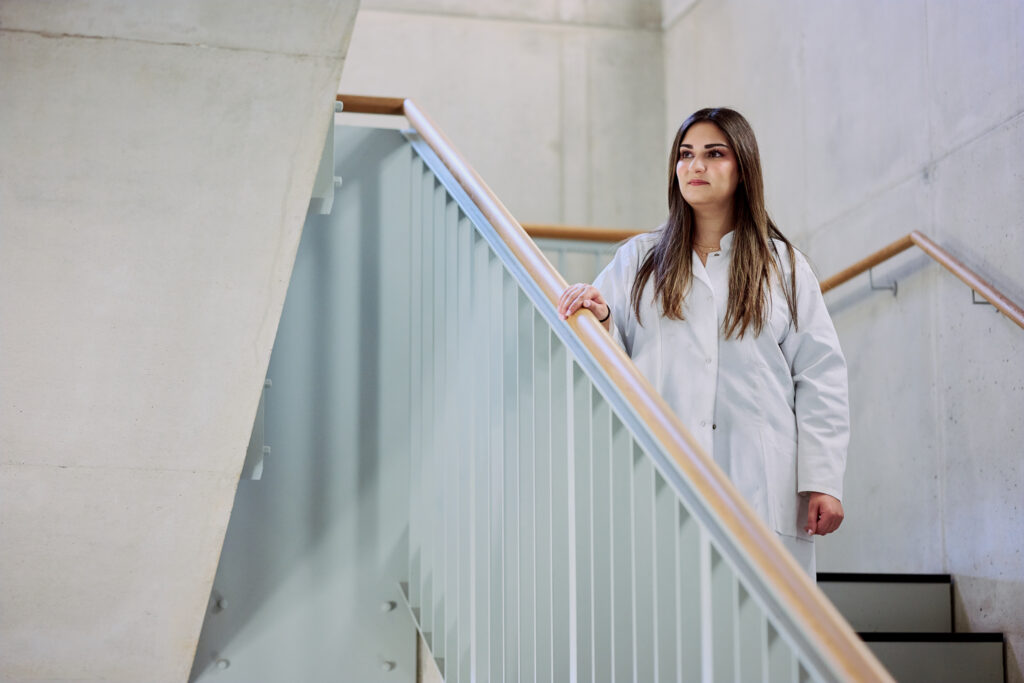
Utilising The Same Molecule for Treating Cancer and Acne? How Is This Possible? – An Interview with Chemist Dr. Amélia Messara
In the series “33 questions” we introduce, in no particular order, our WiRe Fellows who are currently working on a research project here at the University of Münster. Why 33? Well, if we think of the rush hour of life, it is kind of the age that lies in the middle. And we also like the number😉.
In today’s episode we are speaking with Dr. Amélia Messara, a chemist and passionate lover of light and alkenes.
1. What motivated you to work in the field of organic chemistry?
Organic chemistry plays an essential role in our daily life and organic compounds are important constituents of many products such as medicines, pesticides or food. I was attracted to the fact that I could synthesize small molecules that could be useful in different fields, such as the pharmaceutical industry.
2. What or who inspired you to become a chemist?
At first, I wanted to become a pharmacist and understand how drugs were synthesized. Then I became more and more passionate about organic chemistry.
3. Describe your research topic in three words.
Photochemistry — Alkenes — Light.
4. How would you explain your research area and topic to a child?
Do you know what photosynthesis is? Photosynthesis is the process by which plants convert sunlight into chemical energy using carbon dioxide and water, allowing them to produce glucose and release oxygen.
If plants can use light energy to carry out chemical reactions, why can’t we use light energy on molecules in the laboratory?
I am working on molecules called alkenes. These molecules are composed of two carbon atoms linked by a double bond. Each carbon atom can carry a chemical group. They can have different geometries. In other words, the groups can be on opposite sides of the molecule, or on the same side. This geometry is very important, as it can confer different properties to the molecule. For example, depending on its geometry, the same molecule could either help cure cancer or treat acne. It is therefore important to be able to control this geometry. Like plants, my project involves using light energy to control this geometry.

5. Describe your work in three words.
Experiments — Analysis — Creativity.
6. How did you imagine the life of a scientist / researcher when you were a high school student? Is it actually different? In what way?
I imagined the life of a scientist in a laboratory, with a lab coat, glasses and disheveled hair, like Doc Brown, in Back to the Future.
And of course it is different in real life, I don’t have disheveled hair! No, more seriously, the life of a scientist also includes a lot of work outside the laboratory in front of a computer to think about an alternative project or read articles related to his or her research, for example.
7. What does a typical work day then look like for you?
I work in a laboratory all day wearing a lab coat and goggles. I run experiments which I then process and analyze to see if I have succeeded in obtaining the desired molecule. I also spend some time in front of my computer reading the various articles related to my project.
8. A good organic chemist needs…?
To me, a good organic chemist needs to be rigorous, patient and always motivated!
9. What keeps you motivated in your work day in and day out?
Seeing my project progress day by day keeps me motivated.
10. What is the best experience you have had as a scientist / researcher?
I had many great experiences, but the most incredible one was my four-month stay at the University of Florida in the United States. I discovered the world of research, a new country and a new culture. This experience was very beneficial for me, both professionally and personally.

11. What was your biggest research disaster? What did you learn out of it?
I would say my biggest research disaster was when my first article as a first author was rejected by a journal. This experience taught me to persevere and to be more patient, because in the end it was published anyway.
12. Which (historical) important scientist / researcher would you like to have dinner with? What would you ask?
Marie Curie, the first woman who was awarded a Nobel Prize. I would ask her if it was not too hard in her day to be a woman working in science, and how she managed being a scientist at a time when the field was dominated by men.
13. What do you consider the greatest achievement in the history of science?
For me, the discovery of the DNA was a major breakthrough!
14. What is your favorite research discipline other than your own?
Without a doubt, biology because it is closely related to chemistry and it is an intriguing area!
15. If time and money were no object: Which research project would you like to do?
I would like to focus on researching synthetic molecules for therapeutic purposes and ideally study their biological activity.

16. In terms of work-life balance: How do you keep your head clear when you are stressed?
I try to give myself some free time to take my mind off things. For example, going out to dinner with friends or trying out a new recipe.
17. What is your favorite place to relax from research?
My parents’ house in Alsace, France, is the best place to relax from research!
18. What is your favorite place in Münster? And what surprised you most about the University of Münster?
I have only been here for a month, but I love walking around the Castle and the Botanical Garden. Regarding the University of Münster, I was surprised by the size of the campus, which is truly immense, and I was also very impressed by the research facilities and equipment.
19. If you could travel in time: in which epoch and at which discovery or event would you have liked to have been there?
I would like to travel to the end of the 19th century, when photochemistry was discovered by the chemist Giacomo Luigi Ciamician and became a major field in organic chemistry.
20. What do you like most about the “lifestyle” of a scientist / researcher?
The satisfaction of having succeeded in finalizing a project and synthesizing the desired molecule. I also enjoy presenting my work and meeting other researchers at conferences.


21. What is the biggest challenge for you when it comes to balancing family and career? How do you master this challenge?
Distance is the biggest challenge for me: My family and friends are in France, so it is not always easy for me to get back to see them.
However, I try to visit them as soon as possible, taking one or more days off.
22. How did you survive your PhD time? What advice and tips do you have for future PhD students?
I was lucky to have some incredible colleagues with whom I could share everything during my PhD time. We helped each other out and cheered each other up when necessary. My family and friends were also very supportive.
I would advise future PhD students not to doubt themselves and to have confidence in themselves, but also to take time out to step back and relativize during difficult times.
23. Do you think your career would have evolved differently if you were a man?
At the moment, I don’t think so, but maybe later if I want to start a family.
24. If you had a daughter, what would you advise her not to do?
I would tell her to never give up on her dreams just because she is a woman, and to never doubt herself.
25. What makes you most happy about the world?
I love travelling and discovering new countries and cultures.

26. Which experience in the world of science disappointed you most?
Technically, it is not an experience, but researchers who falsify their data in order to publish in journals with a high impact factor are what disappoints me most in the world of science.
27. What was the funniest moment you had in science?
On several occasions during my PhD thesis, middle school students came to the laboratory to discover chemistry and the world of research. We used to perform fun chemical experiments with lots of colors or with dry ice. It was always great to see them amazed and surprised. After that, they were all convinced that they wanted to become chemists!
28. What direct or indirect relevance does your research have for society?
As mentioned before, organic chemistry is fundamental to our daily lives (medicines, clothes, food, etc.). My research is more precisely focused on photochemistry. Photochemistry enables chemical transformations to be performed using light as an energy source. This area is very attractive because photochemical processes are greener and safer than thermal reactions in which the reactant needs heat as an energy source. In addition, photochemistry can provide access to compounds that are not accessible by classical thermal activation since it proceeds differently.Therefore it would be very useful for industrial purposes.
29. Where do you see yourself in 10 years?
In ten years , I would like to be working in a pharmaceutical company, but I would also like to have started a family with a cat!

30. Which of your traits bothers you the most in your daily work?
My perfectionism and my aversion to administrative tasks.
31. And which of your traits help you the most in your daily work?
My rigor and perseverance.
32. If you were the research minister of Germany, what would you do to improve the situation of women in science?
This is a hard question but I think it would be great to create and support fellowships such as the WiRe program!
33. And last but not least: What is your favorite German word? Why?
“Flammkuchen”, because it is one of my favorite dishes!
